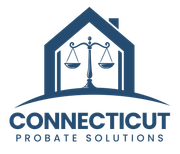Probate Help in Connecticut
Home Buyout Program, Estate Sales, Clean-outs and, Attorney Referrals.
Free Consultation
Contact Us
We will get back to you as soon as possible.
Please try again later.
Personalized Probate Roadmap

1. File Petition with Probate Court
Open the estate by filing a petition in the Connecticut Probate Court where the decedent lived.

2. Hire an Attorney (Recommended)
While not required, many families choose to work with a probate attorney for legal guidance and court filings.

3. Appointment of Executor or Administrator
The court appoints the executor named in the will, or an administrator if no will exists.

4. Notify Heirs and Creditors
All heirs, beneficiaries, and creditors are notified of the probate proceedings.

5. Inventory and Manage the Estate
The executor/administrator files an inventory of assets (including real estate) and ensures they are maintained.

6. Estate Sales & Clean-Out Services
Personal property may be sold or distributed. We assist with estate sales and full clean-outs to prepare the home for its next chapter.

7. Pay Debts, Taxes & Distribute Assets
The estate’s valid debts, expenses, and taxes are paid before remaining assets are distributed to heirs or beneficiaries.

8. Sell the Home (Optional)
If the family chooses not to keep the property, our Home Buyout Program offers a fast solution: a fair cash offer within 24 hours and closing in as little as 14 days.
What to Do with the Probate Property?
When probate is complete, families often face a big decision: keep the home or sell it hassle-free. Here’s how the options compare:
Option A: Keep the Home
- Ongoing mortgage, taxes, insurance, and maintenance costs
- Responsibility for repairs and updates
- Must coordinate among heirs if multiple family members are involved
- Longer timeline before the estate can be fully settled
Option B: Sell Through Our Home Buyout Program
- Receive a fair cash offer within 24 hours
- Close in as little as 14 days — no waiting for the market
- No repairs, showings, or realtor fees required
- Estate settles faster, allowing heirs to move forward with peace of mind
Our Buyout Program takes the stress out of probate real estate — quick, fair, and hassle-free.
A Guide to Probate in CT: Process, Cost & How to Avoid It
When a loved one passes away in Connecticut, the word "probate" often brings more questions than answers. It's the state's official process for settling an estate, but the most pressing question is often the first: Is it even necessary?
Here’s the key piece of information: not every estate needs to endure the full probate process. For instance, Connecticut offers a simplified procedure for "small estates" where certain assets total less than $40,000.
Understanding this distinction is the first step toward clarity and confidence. This guide illuminates the entire domain, from the specific requirements that trigger probate to the
step-by-step court process and the costs involved.
We'll also explore strategic ways to avoid it entirely. You can create a more direct path for your family's assets using powerful tools like living trusts and beneficiary designations.
Let's demystify Connecticut probate together. This will give you a clear and manageable road map for the responsibilities ahead.
What Is Probate In Connecticut And When Is It Required
When a loved one passes away, their property doesn't automatically transfer to family members. There's a formal, court-supervised process called probate to ensure everything is handled correctly. We know this can be an overwhelming time, so let's walk through what this process means for you.

Core Purpose And Function Of Connecticut Probate Courts
At its heart, probate is a protective measure designed to honor a person's final wishes. Think of the Connecticut Probate Court as a referee overseeing the entire process of settling an estate. Its main job is to ensure several key things happen:
- The will is validated: The court confirms the decedent's (the person who passed away) will is legally sound.
- An executor is appointed: An official representative is named to manage the estate's affairs.
- Debts and taxes are paid: All legitimate claims against the estate are settled first.
- Assets are distributed: The remaining property is passed on to the correct beneficiaries and heirs.
Mandatory Filing Requirements Within 30 Days Of Death
Here’s a critical deadline you absolutely cannot miss. An application to administer the estate must be filed with the appropriate Probate Court within 30 days of the decedent’s death.
This is a firm requirement, regardless of whether you believe the full probate process will be necessary. This initial filing officially notifies the court and is a mandatory first step in nearly every situation.


Asset Thresholds That Trigger Full Probate Proceedings
So, what determines if an estate needs to go through the full, formal probate process? It all comes down to ownership.
Probate is typically required only for assets that were titled solely in the decedent's name, like a house, car, or bank account they owned alone. What this means for you is that the ownership documents are key.
Now, here’s some good news for smaller estates. Connecticut offers a significant shortcut if the total value of the decedent's solely owned assets is less than $40,000 and includes no real estate.
The estate can then qualify for a simplified procedure using a form called the "Affidavit in Lieu of Administration of Decedent's Estate" (PC-212), avoiding the time and expense of formal probate.
Situations Where Probate May Be Avoided Entirely
The best way to handle probate is often to plan ahead to avoid it entirely. Certain types of asset ownership allow property to pass directly to a new owner without any court involvement. These
"non-probate assets" typically include:
- Assets in a Living Trust: Property held in a living trust is governed by the trust's rules, not the will, steering clear of the probate court entirely.
- Jointly Owned Property: For assets owned as "joint tenants with right of survivorship," like a house or bank account, the surviving owner automatically inherits the property. No court action is needed.
- Assets with Beneficiary Designations: Many financial accounts let you name a beneficiary directly. Upon death, funds from life insurance policies, 401(k)s, IRAs, and bank accounts with a "Payable on Death" (POD) designation go straight to the person you named.

Connecticut's Unique Probate Court System And Structure
The word "court" often brings to mind a formal, intimidating room. But Connecticut's probate system was intentionally designed to be different. It’s a specialized network built to be more accessible for the families it serves. Knowing how this unique structure works can make the entire process feel far less overwhelming.

Specialized Probate Court Districts And Jurisdictions
Unlike a general courthouse handling everything from traffic tickets to major trials, Connecticut's 54 Probate Courts are specialists. They are courts of "limited jurisdiction"—a legal term meaning they focus only on specific family-related matters. Their primary responsibilities cover a narrow, important scope:
- Overseeing the administration of a deceased person's estate
- Managing trusts and conservatorships
- Appointing guardians for minors and adults with intellectual disabilities
- Processing adoptions and legal name changes
Each of these 54 districts serves one or more of Connecticut's 169 towns. What this means for you is that you must file your case in the specific district where the person who passed away legally resided.
The judges who preside over these courts are publicly elected for four-year terms. And here’s a detail that really highlights the system’s unique approach: judges are not required by state law to be attorneys, emphasizing a focus on community administration over rigid legal formality.
User-Friendly Informal Hearing Process And Conference Room Settings
Perhaps the biggest difference you'll notice in Connecticut probate is the atmosphere itself. The state has worked hard to make the process less intimidating for families. Forget the classic courtroom you see on TV. Many hearings actually happen in a relaxed conference room.
The judge often won't wear robes, and the whole proceeding feels more like a structured meeting than a formal trial. This approach is designed to help families ask questions and sort things out without the stress of an adversarial setting, especially during a difficult time.


Recent District Consolidations And Geographic Coverage Changes
Here's a critical piece of information if you're trying to find the right court: the map has changed. In 2011, Connecticut consolidated its probate courts to improve efficiency, shrinking the number from 117 down to the 54 we have today.
What this means for you is that one probate district might now serve several towns. For instance, the former Enfield and Stafford districts are now combined into the single North Central Connecticut Probate District.
The bottom line? You must confirm the correct district court for the specific town where the decedent lived to avoid filing in the wrong place.
Limited Staff Assistance Versus Professional Legal Representation
The staff at the Probate Court are a fantastic resource for helping you through the process. They are typically very helpful and can point you to the right forms and answer questions about procedure.
But here's the critical distinction: court staff are legally prohibited from giving legal advice. Think of it this way: they can hand you the map, but they can't tell you which route to take.
They can tell you what form to file for a certain step. They cannot, however, advise you on how to fill it out for your unique circumstances or give you a strategy for handling a complex creditor claim.
For a very simple, uncontested estate, this guidance might be enough. But if the situation involves business assets, real estate in another state, or potential family disagreements, seeking professional legal counsel isn't just a good idea—it's essential for protecting your interests.

Complete Step-By-Step Connecticut Probate Process
Once an estate enters probate, the path forward can feel like a long and complicated checklist. It’s more manageable when you see it as a series of logical steps.
The court appoints a "fiduciary"—either an executor named in the will or an administrator if there is no will—to be the estate's trusted guide on this journey. Let's break down the key stages from start to finish.

Initial Filing Requirements And Form PC-200 Submission
The process officially begins with a critical deadline. By law, whoever holds the decedent's original will must file it with the correct Probate Court within 30 days of their death. This is a non-negotiable first step.
To formally open the estate, the fiduciary or their attorney files a petition using Form PC-200, "Petition/Administration or Probate of Will." This form, along with the original will and a certified death certificate, officially gets the process underway. Once filed, the court schedules a hearing and notifies all heirs, ensuring everyone is aware of the proceedings from day one.
Executor Appointment And Decree Granting Administration
The initial hearing is where the court makes things official. A judge reviews the petition and, if everything is in order, issues a Decree Granting Administration, which is the court order that formally names the executor or administrator.
With this decree comes an essential document: "Letters Testamentary" (for an executor) or "Letters of Administration" (for an administrator). Think of this as the fiduciary's official ID badge. It grants them the legal authority to act on behalf of the estate, like accessing the decedent's bank accounts or communicating with financial institutions.
The court might also require a bond, which is essentially an insurance policy to protect the heirs, though a well-drafted will can often waive this.


Asset Inventory Filing And Property Management Responsibilities
Within two months of appointment, the fiduciary has a major task: compiling a complete inventory of the estate's assets on Form PC-440. This isn't a casual list; it's a formal accounting of everything the decedent owned in their name alone, valued at its fair market value on the date of death. This inventory includes assets such as:
- Real estate titled solely in the decedent's name
- Bank and investment accounts that lack a payable-on-death beneficiary
- Vehicles, jewelry, art, and other tangible personal property
Here's the thing: not everything is included. Assets like jointly owned property with rights of survivorship or a life insurance policy with a named beneficiary pass directly to their new owners outside of the probate process.
Creditor Notification Procedures And Claim Resolution Timeline
An estate isn't just about assets; it's also about debts. The fiduciary must notify potential creditors of the death, typically by publishing a notice in a local newspaper. This starts a 150-day countdown for creditors to submit formal claims for any money owed.
The fiduciary then acts as a gatekeeper, carefully reviewing each claim, verifying its legitimacy, and paying valid debts—like funeral costs, final medical bills, and credit card balances—from the estate's funds.
What this means for you is that all debts must be settled before heirs get paid. The fiduciary must also file a Connecticut estate tax return (Form CT-706/709 or CT-706 NT). And here’s a detail that trips many people up: this return is required even if the estate is non-taxable and owes nothing.


Final Account Preparation And Estate Distribution Process
After all assets are gathered and all legitimate debts and taxes are paid, the fiduciary prepares a final accounting. This is a detailed financial report for the court and beneficiaries, showing every dollar that came in, every expense that went out, and the plan for distributing what's left.
Beneficiaries receive this report and have the right to review it and ask questions. It’s a crucial step for transparency. Once the court approves the final account, the fiduciary subsequently gets the green light to distribute the assets to the rightful heirs.
After everyone receives their inheritance, the fiduciary files receipts and a final statement with the court, which officially closes the estate.
Types Of Probate Proceedings Available In Connecticut
Not every estate involves managing the same legal intricacies. Thankfully, Connecticut law recognizes that a simple estate shouldn't face the same hurdles as a complex, multi-million-dollar one.
The specific path an estate follows is almost entirely determined by the value of its assets. Understanding these different routes is the key to setting realistic expectations for the time, cost, and effort involved.

Full Formal Probate For Complex Estates
This is the most detailed process, sometimes called supervised probate. It’s the required path when an estate has certain triggers. Full probate is generally necessary if:
- The decedent’s solely owned assets are valued at more than $40,000.
- The estate contains any real estate, regardless of the property's value.
In this proceeding, the court formally appoints a fiduciary—an executor named in the will or an administrator appointed by the court. This person manages every step under court supervision, from filing the inventory and notifying creditors to paying final taxes.
Before any assets can be distributed, the fiduciary must submit a detailed final accounting for the court's approval. It’s a thorough process designed to protect everyone involved when significant assets or property are at stake.
Simplified Small Estate Process For Assets Under $40,000
Here’s where things get much simpler for many families. If the decedent's solely owned assets have a total value of $40,000 or less and include no real estate, the estate can likely use a streamlined procedure.
Instead of the full process, an interested party can file a specific form: PC-212, the "Affidavit in Lieu of Administration." What this means for you is the court doesn't need to formally appoint an executor.
The person who files the affidavit (the affiant) gets the authority to pay final bills, like funeral expenses, and then distribute the remaining assets directly to the heirs. This route is significantly faster and less expensive, avoiding most of the formal court oversight.


Informal Probate Administration Options
Here's something that surprises many people about Connecticut's system. Even "full formal probate" is designed to be less intimidating than in many other states.
As our probate attorneys can confirm, hearings often take place in a conference room, not an imposing courtroom. The system's goal is to improve the process, not create unnecessary barriers. Court staff can even provide guidance on forms and procedures, contributing to a more user-friendly experience from start to finish.
Special Procedures For Estates Without Valid Wills
What happens if there's no will? This is known as dying "intestate," and while it sounds complicated, it doesn't automatically create a new type of probate proceeding.
The path forward—either full probate or the small estate process—is still determined by the value of the assets. The key difference lies in who makes the decisions. Without a will to name an executor and beneficiaries, Connecticut's intestacy laws step in.
The court will appoint an "administrator" to manage the estate, and the law provides a strict hierarchy (spouse, then children, etc.) to determine who inherits the property. The "how" of probate stays the same; the law just provides the map for the "who."

Comprehensive Cost Analysis And Fee Structure
Let's get straight to the question on everyone's mind: what is this going to cost? Understanding the financial side of probate is crucial, as the total expense can shift dramatically with the estate's complexity.
Here's the most important thing to know upfront. All legitimate probate costs are paid directly from the estate's assets before any inheritance is distributed to the heirs.

Mandatory Court Filing Fees And Administrative Costs
First up are the non-negotiable costs set by state law. Connecticut's Probate Courts charge a statutory fee based on the estate's total value.
The calculation, found in Connecticut General Statutes § 45a-107, uses a figure called the "basis for fees." Think of this as the estate's total inventory value, plus any profits from selling property, minus any losses from those sales.
For most estates, the math is straightforward. If an estate is valued under the 2024 Connecticut estate tax threshold of $13.61 million, the court fee is 0.25% of the basis for fees.
There’s a minimum charge of $25. Crucially, the fee is capped at $5,000 for these estates, providing a predictable ceiling. This court fee is paid directly to the state and is completely separate from any compensation for the executor or attorneys.
Executor Compensation Guidelines And Limitations
How much does the person managing the estate—the executor—get paid for their work? Unlike some states with fixed percentages, Connecticut law simply says fiduciaries are entitled to "reasonable compensation." So, what does "reasonable" actually mean? The court considers several factors to decide.
- The overall size and complexity of the estate.
- The actual time and effort the executor invested.
- The specific skills needed to manage unique assets like a business or a large investment portfolio.
- The results achieved for the estate and its beneficiaries.
Here’s the thing: all executor fees must be reviewed and approved by the Probate Court. Beneficiaries have a right to review the proposed fee and can object if it seems out of line, ensuring the payment fairly reflects the work performed.

Attorney Fees For Professional Legal Representation
Much like executor compensation, there is no state-mandated fee schedule for probate attorneys. An attorney might propose a flat fee for a simple, straightforward estate.
For more complex situations, they will likely charge an hourly rate. In either case, the fundamental principle is the same: the fees must be "reasonable" for the legal services provided.
To justify the cost, the attorney and executor typically file an affidavit with the court detailing all the work performed. A judge must approve these legal fees before they can be paid, adding another layer of oversight to protect the estate's assets.
Hidden Costs And Unexpected Expenses During Probate
Beyond the major fees, other expenses often arise during the administration process. These are easy to overlook in initial estimates, but are crucial for settling the estate correctly. Some of the most common examples we see include:
- Surety Bond Premiums: A court may require the executor to post a bond, which is an insurance policy that protects the estate's assets from mismanagement. The estate itself pays the premium for this policy.
- Appraisal Fees: Professional appraisals are essential for accurately valuing real estate, business interests, art, or jewelry.
- Accounting Fees: An accountant is often needed to prepare the decedent's final income tax returns or the estate's own fiduciary tax returns.
- Miscellaneous Administrative Costs: These smaller costs can add up. Think of court filing fees for various motions, the cost of publishing legal notices to creditors in a local paper, or expenses for maintaining a property (like utilities and lawn care) until it's sold.

Strategic Probate Avoidance Methods And Estate Planning
The time and expense of probate often lead people to ask a simple question: Can my family avoid this process altogether? For many, the answer is a resounding yes.
Through smart estate planning, you can arrange for your assets to transfer directly to your loved ones, bypassing Probate Court supervision entirely. These are known as "non-probate assets."
Here's the thing: avoiding probate isn't about finding a secret loophole. It's about using well-established legal tools to create an automatic transfer of your property when you pass away. Let's walk through the most effective strategies we use for clients right here in Connecticut.

Living Trust Creation And Asset Transfer Benefits
A revocable living trust is one of the most powerful and popular tools for avoiding probate. Think of it as a legal container you create to hold your most important assets.
During your lifetime, you act as the "grantor" by transferring ownership of property—your house, specific bank accounts, investments—into this container. You also name yourself the "trustee," meaning you keep 100% control to manage, use, or sell the assets just as before.
What this means for your family is a seamless transition. When you pass away, the person you named as your "successor trustee" simply steps in and follows your instructions to distribute the assets.
There's no court approval needed and no public record of the transfer. It's a private, efficient process that can save your heirs thousands of dollars and months, or even years, of waiting.
Joint Ownership Arrangements And Right Of Survivorship
For certain assets, a simpler method is owning property jointly with another person. But the details are critical. The key is the specific type of ownership: "joint tenants with right of survivorship."
When property in Connecticut is titled this way—whether it's your home or a shared bank account—it automatically passes to the surviving owner upon your death. That asset completely sidesteps the probate process.
For example, if you and your spouse own your home with this designation, the house becomes solely theirs the moment you pass away. No court filings, no delays.
Here's a crucial piece of local knowledge: Connecticut does not recognize "tenancy by the entirety," a special ownership status for married couples that exists in other states. This makes getting the "right of survivorship" language correct on your deeds and accounts especially important for couples here.


Transfer-On-Death Designations For Financial Accounts
Many financial accounts offer a straightforward way to bypass probate using a beneficiary designation. It's often as simple as filling out a one-page form with your financial institution. These designations act as a direct command for where the money should go upon your death.
- Payable-on-Death (POD): This is for bank accounts like checking and savings. The money is all yours during your life, but it's paid directly to your named beneficiary when you pass.
- Transfer-on-Death (TOD): This works the same way but applies to securities, such as stocks, bonds, and brokerage accounts. Your investments transfer directly to your beneficiary, avoiding probate.
Don't forget, this is also how most life insurance policies and retirement accounts (like your 401(k) or IRA) already work. Naming a beneficiary is one of the easiest and most effective estate planning moves you can make.
A Note on Real Estate and Beneficiary Designations
While POD and TOD designations are great for financial accounts, there's a major exception people need to know about. This tool does not work for real estate in our state.
Crucially, Connecticut has not enacted a law permitting the use of transfer-on-death (TOD) deeds for real property. This is a common point of confusion that can lead to major problems.
If you want your house to avoid probate, you must use a different strategy. The most common solutions are placing it in a living trust or owning it as joint tenants with right of survivorship.
Attempting to use a TOD deed for your home is a plan that is guaranteed to fail. That property will end up right back in the probate process you were trying to avoid.

Common Challenges And Dispute Resolution In Connecticut Probate
Let's be honest: mixing grief, family interactions, and money can be a recipe for tension. Even with the best intentions, settling an estate isn't always a smooth process.
But here's something important to remember. Connecticut’s Probate Courts aren't just for paperwork; they are specifically designed to be a fair and legal place to resolve these very disputes. Understanding the common challenges can help you recognize potential issues and know what steps to take.

Will Contest Procedures And Grounds For Challenging Validity
A "will contest" is probably the most famous type of probate dispute. This happens when an interested party—often a child who was left out or received a smaller inheritance than their siblings—formally argues that the will itself is legally invalid.
It's crucial to understand this isn't simply about being unhappy with what the will says. To succeed, the challenger must prove to the court that there are specific, recognized legal grounds to invalidate the entire document. Common grounds for a will contest in Connecticut include:
- Lack of Testamentary Capacity: This means arguing the person signing the will (the testator) wasn't of sound mind. For example, they might not have understood what property they owned, who their closest relatives were, or the consequences of the document they were signing.
- Undue Influence: This is a claim that the testator was pressured or manipulated by someone in a position of trust. Think of a caregiver who convinces an elderly person to change their will to leave them everything, cutting out the family.
- Improper Execution: A will is a formal document with very strict rules. If it wasn't signed, dated, and witnessed exactly as Connecticut law demands, it can be invalidated.
- Fraud or Duress: This involves proving the signature was obtained through lies (fraud) or by a direct threat of harm (duress). It's a serious allegation that the will wasn't signed freely.
Beneficiary Disputes And Inheritance Conflicts
Sometimes, everyone agrees the will is valid, but the conflict starts when it's time to put it into action. The arguments are often about the nuts and bolts of settling the estate.
A major sticking point is often the value of assets. How much is the family home really worth? What about a small business or that antique art collection? Getting this number right is critical because it affects each beneficiary's share and can have a big impact on the estate's tax bill.
Then there's the issue of vague language. What happens if a will states, "I leave my car to my nephew," but the person owned a 1965 Mustang and a 2022 sedan? In a case like this, an interested party might need to file a "will construction" action, asking the court to step in and determine the decedent's true intent.


Executor Misconduct Claims And Removal Procedures
The executor has a powerful role with a serious legal obligation called a "fiduciary duty." In plain English, this means they must always act in the best interests of the estate and its beneficiaries, not themselves.
When beneficiaries feel that trust has been violated, they have the right to hold the executor accountable. An executor can be challenged and even removed by the Probate Court for breaching this duty. Common claims of misconduct include:
- Mismanaging estate assets, like letting a property fall into disrepair.
- Failing to provide a clear and complete accounting of all money coming in and going out.
- Engaging in self-dealing, such as selling an estate home to themselves for a suspiciously low price.
If the court agrees the claims are valid, it has the power to remove the executor. It will then appoint a new, neutral administrator to step in and manage the estate properly.
Power Of Attorney Disputes And Guardianship Issues
It's a common misconception that probate only deals with what happens after someone passes away. The Connecticut Probate Court also handles disputes involving the care of living individuals, and these issues can easily spill over into the probate process later on.
For instance, what if an agent under a power of attorney made some questionable financial decisions before the person died? Beneficiaries might scrutinize those actions, suspecting mismanagement that reduced the estate's value.
The court also oversees the appointment of guardians and conservators for people who can no longer manage their own affairs, a process that can be incredibly difficult and contentious for families. These pre-death conflicts can create a tense environment, setting the stage for more disputes once the estate officially enters probate.
If family members can't resolve these issues through negotiation, the court might suggest mediation or move to formal hearings.
It's also important to know that a final decision from the Probate Court isn't always the last word; an appeal can be made to the Connecticut Superior Court, which will hear the case "de novo"—a legal term that means it takes a completely fresh look at all the facts and evidence.

Frequently Asked Questions
Can I handle Connecticut probate without hiring an attorney?
Yes, you can legally move forward through the Connecticut probate process on your own. This is known as acting "pro se," and the state's Probate Courts are designed to be accessible, providing all the necessary forms.
Here’s the thing to remember: court staff can explain procedures, but they are legally barred from giving you legal advice. As a pro se executor, you're held to the same high fiduciary standards as a lawyer, and a simple mistake could lead to serious financial or legal trouble.
How long does the typical probate process take in Connecticut?
The timeline really depends on the complexity of the estate. The absolute minimum is around five to six months, a timeframe dictated by a mandatory 150-day period for creditors to make claims.
For a very straightforward estate with no disputes, you can generally expect the process to take between nine months and one year. What this means for you is that the timeline can stretch much longer if complications arise, like a will contest, beneficiary disputes, or the need to file estate tax returns.
What happens if someone dies without a will in Connecticut?
When a person passes away without a will, it's legally called dying "intestate." In this case, Connecticut's intestate succession laws act as a default plan for distributing their assets.
These laws create a clear inheritance hierarchy based on family relationships. For example, if the person leaves a spouse and children from that marriage, the spouse typically inherits the first $100,000 of the estate plus half of the rest, with the children inheriting the other half.
The Probate Court then appoints an "administrator" to manage the estate, often a close relative who applies for the position.
Are there assets that automatically avoid probate in Connecticut?
Absolutely. Many assets are designed to pass directly to new owners without court involvement. This is a key part of modern estate planning. These non-probate assets often include:
- Property held in a living trust
- Life insurance proceeds with a named beneficiary
- Retirement accounts like 401(k)s and IRAs with designated beneficiaries
- Bank accounts with a "Payable on Death" (POD) designation
- Investment accounts with a "Transfer on Death" (TOD) designation
- Real estate owned as "joint tenants with rights of survivorship"
Can probate proceedings be challenged or contested after they begin?
Yes, a will can be formally challenged in Probate Court after it's been submitted. However, not just anyone can file a contest; you must have legal "standing," which means you have a direct financial interest in the estate.
A challenge must be based on specific legal grounds, such as arguing the deceased lacked mental capacity, was under undue influence, or the will was fraudulent. It's critical to act fast, as Connecticut law imposes strict deadlines for filing a will contest.
Conclusion
Settling a loved one's estate in Connecticut can feel overwhelming. Even though our state's probate system is considered more user-friendly than most, that doesn't make the process any less emotionally or practically challenging. What this means for you is that the path forward depends entirely on the specifics of the situation. The two biggest factors are:
- The Estate's Value: Does it qualify for Connecticut's simplified "small estate" process by having assets under $40,000?
- The Will: Is there a legally valid will to guide the distribution of assets, or will the state's rules decide?
Here's the thing: while you might be steering this for someone else now, you hold the power to make it much simpler for your own family later. Proactive estate planning is really about giving your loved ones clarity and peace of mind when they need it most.
A well-thought-out plan can help your family avoid probate court altogether for certain assets. By using tools like living trusts or simply ensuring financial accounts have designated beneficiaries, you can help loved ones bypass many of these intricacies.
Taking control of your estate plan isn't just a financial task. It's one of the most meaningful gifts you can give to protect your family from future stress and uncertainty.

